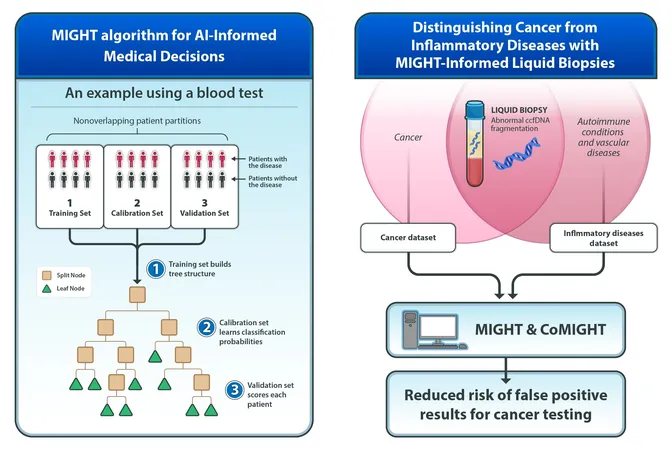
Revolutionizing Cancer Detection: Meet the MIGHT Algorithm!
2025-08-18
Author: Arjun
Introducing the Game-Changer in AI for Cancer Detection
In a groundbreaking advance for artificial intelligence (AI), researchers from the prestigious Johns Hopkins Kimmel Cancer Center and the Whiting School of Engineering have unveiled MIGHT—a revolutionary algorithm that significantly boosts the reliability and accuracy of AI applications, especially in medical diagnostics.
MIGHT: The New Frontier in Early Cancer Detection
Designed specifically to bolster confidence in clinical decision-making, MIGHT (Multidimensional Informed Generalized Hypothesis Testing) is proving to be a game-changer in the quest for earlier cancer detection. One striking application of MIGHT is its ability to analyze circulating cell-free DNA (ccfDNA) from blood samples, a technique known as liquid biopsy. This innovation has the potential to redefine how we detect cancers at earlier stages.
A Dual Approach: Tackling Cancer and Inflammation
In a dual study effort published in the esteemed Proceedings of the National Academy of Sciences, researchers demonstrated not only the high sensitivity of MIGHT for cancer detection but also its complexities. By integrating data from autoimmune and vascular diseases, MIGHT enhances its ability to differentiate between cancerous and non-cancerous signals, aiding in reducing false positives—a crucial element in clinical applications.
CoMIGHT: Pushing the Envelope Further
But that’s not all! Researchers have also developed CoMIGHT—an extension of MIGHT that strategically combines multiple biological variable sets to refine cancer detection even further. Tests using CoMIGHT revealed that while pancreatic cancers were easier to detect, early-stage breast cancer could benefit significantly from this multi-faceted approach.
A Surprising Discovery: Inflammation Mimics Cancer Signals
More surprising findings emerged, revealing that ccfDNA fragmentation patterns traditionally thought to be cancer-specific also manifest in patients with various autoimmune and vascular conditions. This critical insight means that inflammation rather than cancer might be causing these similar signals, complicating the diagnostic landscape.
Overcoming Challenges for Real-World Application
As MIGHT paves the way for innovative cancer detection, researchers are keenly aware that significant hurdles remain for AI in clinical settings. The transition from experimental to routine use requires overcoming key challenges, including public trust in AI, the need for diverse training data, and ensuring the transparency of AI decision-making processes.
The Future of AI in Medicine is Bright
Lead investigator Joshua Vogelstein emphasizes that MIGHT isn't just a tool for cancer detection; it holds promise across various scientific domains where data complexity and uncertainty are paramount. MIGHT and its extended counterpart CoMIGHT are now publicly accessible, aiming to aid researchers and clinicians alike in gathering more reliable and reproducible results.
Next Steps: The Path to Clinical Integration
While the potential for MIGHT in transforming cancer detection is immense, further clinical trials and validations are necessary. Bert Vogelstein, another leading figure behind this research, stresses that trust in these AI-driven results is crucial. As MIGHT continues to evolve, it stands poised to usher in a new era of precision diagnostics.
A Collaborative Triumph
This remarkable achievement is a collaborative effort involving international researchers, including critical contributions from Vietnam's scientific community. MIGHT is set to become a cornerstone in the fight against cancer, illuminating the path toward earlier detection and better outcomes.


 Brasil (PT)
Brasil (PT)
 Canada (EN)
Canada (EN)
 Chile (ES)
Chile (ES)
 Česko (CS)
Česko (CS)
 대한민국 (KO)
대한민국 (KO)
 España (ES)
España (ES)
 France (FR)
France (FR)
 Hong Kong (EN)
Hong Kong (EN)
 Italia (IT)
Italia (IT)
 日本 (JA)
日本 (JA)
 Magyarország (HU)
Magyarország (HU)
 Norge (NO)
Norge (NO)
 Polska (PL)
Polska (PL)
 Schweiz (DE)
Schweiz (DE)
 Singapore (EN)
Singapore (EN)
 Sverige (SV)
Sverige (SV)
 Suomi (FI)
Suomi (FI)
 Türkiye (TR)
Türkiye (TR)
 الإمارات العربية المتحدة (AR)
الإمارات العربية المتحدة (AR)